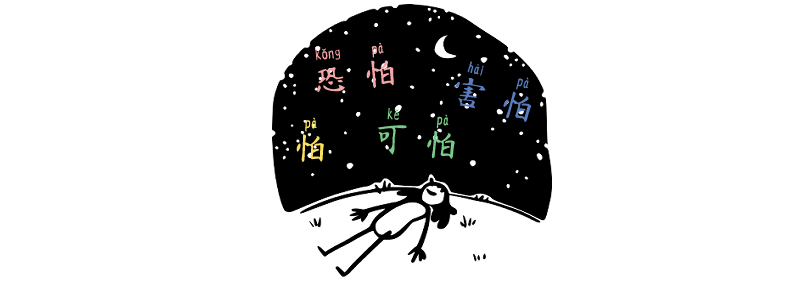Grammar Point:
怕 pà, 害怕 hàipà, 可怕 kěpà, and 恐怕 kǒngpà are all related to the concept of fear, but they have different nuances in meaning and usage in Chinese.
Before we start, let’s have a small quiz. Do you know which one is correct?
我可怕我的中文老師我可怕我的中文老师
我害怕說中文我害怕说中文
我恐怕天氣會下雨我恐怕天气会下雨
我的中文老師很怕我的中文老师很怕
害怕 hàipà
S + 害怕 hàipà + O
V. be afraid; be scared. You always need an object after it.
我害怕鬼我害怕鬼
I am afraid of ghosts.
媽媽害怕蟑螂妈妈害怕蟑螂
Mom is afraid of cockroaches.
可怕 kěpà
Adj. fearful; scary; terrible. Something is terrible.
鬼超級可怕鬼超级可怕
Ghosts are super scary.
媽媽覺得蟑螂超級可怕妈妈觉得蟑螂超级可怕
Mom thinks cockroaches are super scary.
恐怕 kǒngpà
Adv. This structure indicates worrying and anxiety. It expresses fear that something will happen. When using this structure, please remember not to repeat the subject as you would in English. Additionally, since you cannot have two subjects in this structure, the subject before 恐怕 kǒngpà and the implied subject after it must be the same.
他恐怕不能去你的派對他恐怕不能去你的派对
I’m afraid he can’t make it to your party.
我這週末恐怕沒有時間我这周末恐怕没有时间
I’m afraid I don’t have time this weekend.
他恐怕他恐怕他他不能去你的派對不能去你的派对 X
He is afraid he can’t make it to your party.
(two subjects X)
我恐怕今天天氣不好我恐怕今天天气不好 X
I’m afraid the weather is not good today.
(subject 1 is “I” but subject 2 is “the weather” X)
怕 pà
怕 pà + VO or SVO or O
V. fear; afraid of; can’t stand something
Adv. indicating worry and anxiety. I am afraid of…
This is the most commonly used one. It can be used interchangeably with both 害怕 hàipà and 恐怕 kǒngpà, but it is more flexible. However, it cannot be used interchangeably with 可怕 kěpà. Additionally, it can also indicate that someone cannot tolerate or bear something.
我怕鬼我怕鬼
I am afraid of ghosts.
這週末这周末我怕我我怕我沒有時間去你家没有时间去你家
I’m afraid I won’t have time to go to your house this weekend.
(The funny thing is if you drop 恐 kǒng, then you will need the extra subject like you saying it in English.)
弟弟很怕熱弟弟很怕热
My brother can’t stand the heat.
我的狗不怕高我的狗不怕高
My dog is not scared of heights.


